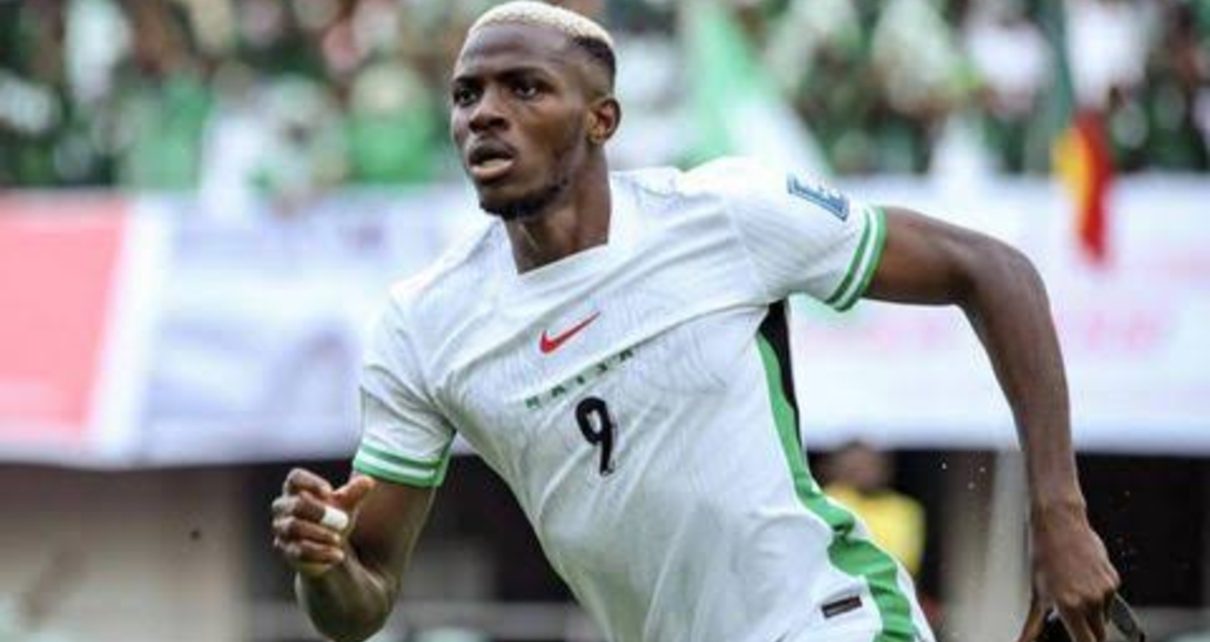The Super Eagles delivered a performance worthy of champions on Tuesday, but it was a victory driven less by glory and more by sheer, desperate survival. Nigeria’s emphatic 4-0 thrashing of Benin Republic secured the team a runner-up finish in Group C, narrowly clinching one of the four coveted spots in the final African playoff tournament for the 2026 FIFA World Cup.
While the celebration in Uyo was well-deserved, the reality remains stark: the Eagles’ World Cup dream survived the group stage not by dominating their group, but by acing the most high-stakes mathematics in CAF history.
South Africa Qualifies, Nigeria Must Now Play Twice
The final day of Group C action confirmed two things. First, South Africa, with their disciplined 3-0 victory over Rwanda, successfully topped the group with 18 points, securing the automatic ticket to the North American tournament.
Second, Nigeria’s win—fueled by a magnificent Victor Osimhen hat-trick—propelled them to second place with 17 points, tied with Benin but boasting a superior goal difference of +7.
However, simply being a runner-up is not enough. With nine groups vying for nine automatic spots, the four best second-placed teams across the continent move on to a special mini-tournament. This is where the crucial, complex CAF ruling came into play.
The Math That Saved the Eagles
Due to the withdrawal of Eritrea earlier in the campaign, CAF introduced a decisive fair-play rule: when ranking the nine runners-up, results obtained against the last-placed team in each group must be discarded.
In Group C, the last-placed team was Zimbabwe. The Super Eagles managed only two draws against Zimbabwe (earning 2 points). Once these points were removed, Nigeria’s true standing in the playoff race was:
- Adjusted Points: 17−2=15 points
- Adjusted Goal Difference: +7
This calculation was absolutely vital. Before the match, Nigeria risked falling outside the top four entirely. The crucial four-goal margin over Benin, capped by Frank Onyeka’s late strike, ensured that the Super Eagles finished with a superior goal difference to rivals like Burkina Faso (also 15 adjusted points) and secured the final ticket to the runners-up playoff tournament. It was a narrow escape that highlighted the team’s resilience under immense pressure.
The Road Ahead: Morocco Awaits
With the group stage now complete for most teams (though a few fixtures in other groups may yet finalize the seedings), Nigeria is confirmed as one of the four teams advancing to the CAF Second Round Playoff.
This mini-tournament will be hosted in Morocco this November. The four surviving teams—including Nigeria, alongside powerhouses like Gabon, DR Congo, and Cameroon—will compete in two one-off semi-finals, followed by a final.
The winner of the Morocco playoff will then earn Africa’s final (10th) slot in the global Inter-confederation Playoff in March 2026, where they will face teams from other continents for a final shot at the World Cup.
The Super Eagles may have navigated the high-stakes group stage, but the most challenging football of the campaign is yet to come. The celebratory relief must quickly turn into rigorous preparation, as the path to the 2026 World Cup has just become a sudden-death sprint.
The second-placed teams table
| Rank | Team | Group | Total Pts | Pts Deducted | Pts (Adjusted) | GD (Adjusted) | Playoff Status |
| 1 | Gabon | F | 22 | 6 | 16 | +12 | QUALIFIED |
| 2 | DR Congo | B | 19 | 4 | 15 | +10 | QUALIFIED |
| 3 | Cameroon | D | 19 | 4 | 15 | +9 | QUALIFIED |
| 4 | NIGERIA | C | 17 | 2 | 15 | +7 | QUALIFIED |
| 5 | Burkina Faso | A | 21 | 6 | 15 | +6 | ELIMINATED |
| 6 | Madagascar | I | 19 | 6 | 13 | +5 | ELIMINATED |
| 7 | Uganda | G | 18 | 6 | 12 | +6 | ELIMINATED |
| 8 | Namibia | H | 15 | 6 | 9 | +3 | ELIMINATED |
| 9 | Niger | E | 15 | 6 | 9 | +1 | ELIMINATED |


